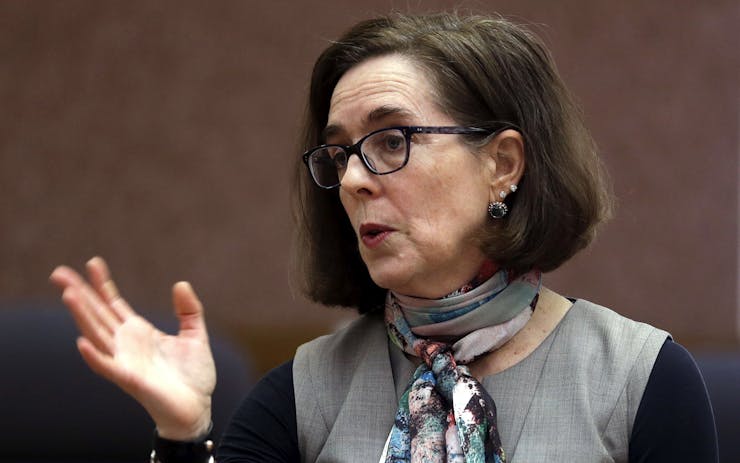Top Oregon officials this week lashed out at US Attorney General Jeff Sessions’ recent attack on the state’s legal cannabis system, saying Sessions’ criticism relied on inaccurate data and drew conclusions that were flat-out wrong.
Sessions has sent memos to state officials in Washington, Colorado, Alaska, and Oregon identifying what his office claims are problems with the states’ legal cannabis systems, which operate in defiance of federal law. But in letters sent this month to Sessions, Gov. Kate Brown and Oregon State Police Superintendent Travis Hampton defended Oregon’s legal cannabis program, saying a police report that Sessions’ memo relied on contained numerous flaws.
“The Oregon State Police determined that the draft report required significant additional work and revision because the data was inaccurate and heavily extrapolated conclusions were incorrect,” Brown wrote. “It is important to understand that this draft report does not (and frankly does not purport to), reflect ‘on the ground’ reality in Oregon in 2017.”
Earlier this month, state police Superintendent Travis Hampton wrote a letter to Sessions distancing his department from its own report. According to Oregon Live, the agency, which received federal money for an analyst to collect and examine cannabis data, “denounced the draft” when they learned the news organization had obtained a copy of it.
Hampton said that the data Sessions used was “not accurate, not validated and outdated,” Oregon Live reported.
In his letter to Oregon officials, Sessions wrote that the state was still a major player in the country’s illegal cannabis market, with Oregon-grown cannabis being diverted elsewhere in the US. He also claimed that overall cannabis production in the state far outweighs demand, and he argued that hash oil manufacturing has fueled a rise in home explosions and other serious injuries.
Officials from other legal-cannabis states have also pushed back against Sessions’ claims. In Washington, which Sessions also claimed has seen numerous explosions related to cannabis extraction, Gov. Jay Inslee and state Attorney General Bob Ferguson corrected Sessions’ claim that “in 2014 alone, 17 THC extraction labs exploded.”
The Washington officials replied: “In three years of legalization, no licensed extraction business has exploded. The incidents referred to in Sessions’ letter were black or gray market facilities, often using butane in an enclosed space rather than a lab.”
Speaking to the Seattle Times, Ferguson said of Sessions, “Honestly, it’s hard to take him seriously if he relies on such outdated information.”
Oregon, Gov. Brown wrote to Sessions, has actually seen a number of benefits from the cannabis industry.
“Despite the concerns surrounding legalization of marijuana, there can be no denying that Oregon has benefited from this industry,” she wrote. “Oregon has already realized $60.2 million in revenue and created over 16,000 jobs for Oregonians. Tax revenue from the marijuana industry is used to fund schools, to provide mental health and drug treatment and to assist both state and local law enforcement.”
Shop highly rated dispensaries near you
Showing you dispensaries nearThe governors of Oregon, Colorado, Washington and Alaska wrote to Sessions and Treasury Secretary Steve Mnuchin in April, warning that altering the Cole memorandum, which restricts federal marijuana law enforcement in states where pot is legal, “would divert existing marijuana product into the black market and increase dangerous activity in both our states and our neighboring states.”
Sessions, however, then wrote to congressional leaders, opposing an amendment that prevents the Justice Department from using appropriated funds to interfere with states’ medical marijuana.
Oregon Democratic Rep. Earl Blumenauer, who co-wrote the amendment with California Republican Rep. Dana Rohrabacher, told The Associated Press recently that Congress is becoming more pro-marijuana, and that more legalization will tamp down the black market.
“The more that we go down the path of legalization, regulation and taxation, diversion becomes less and less of a problem,” Blumenauer said.
Brown told Sessions in her letter that Oregon’s medical and recreational marijuana industry has raised over $60.2 million in revenue and created over 16,000 jobs.
She said her staff looks forward to continuing its work with Session’s office and his representative in Oregon “to end black market marijuana operations, and to provide mutual education and support of our legal and regulated marketplace.”
The Associated Press contributed to this report.





